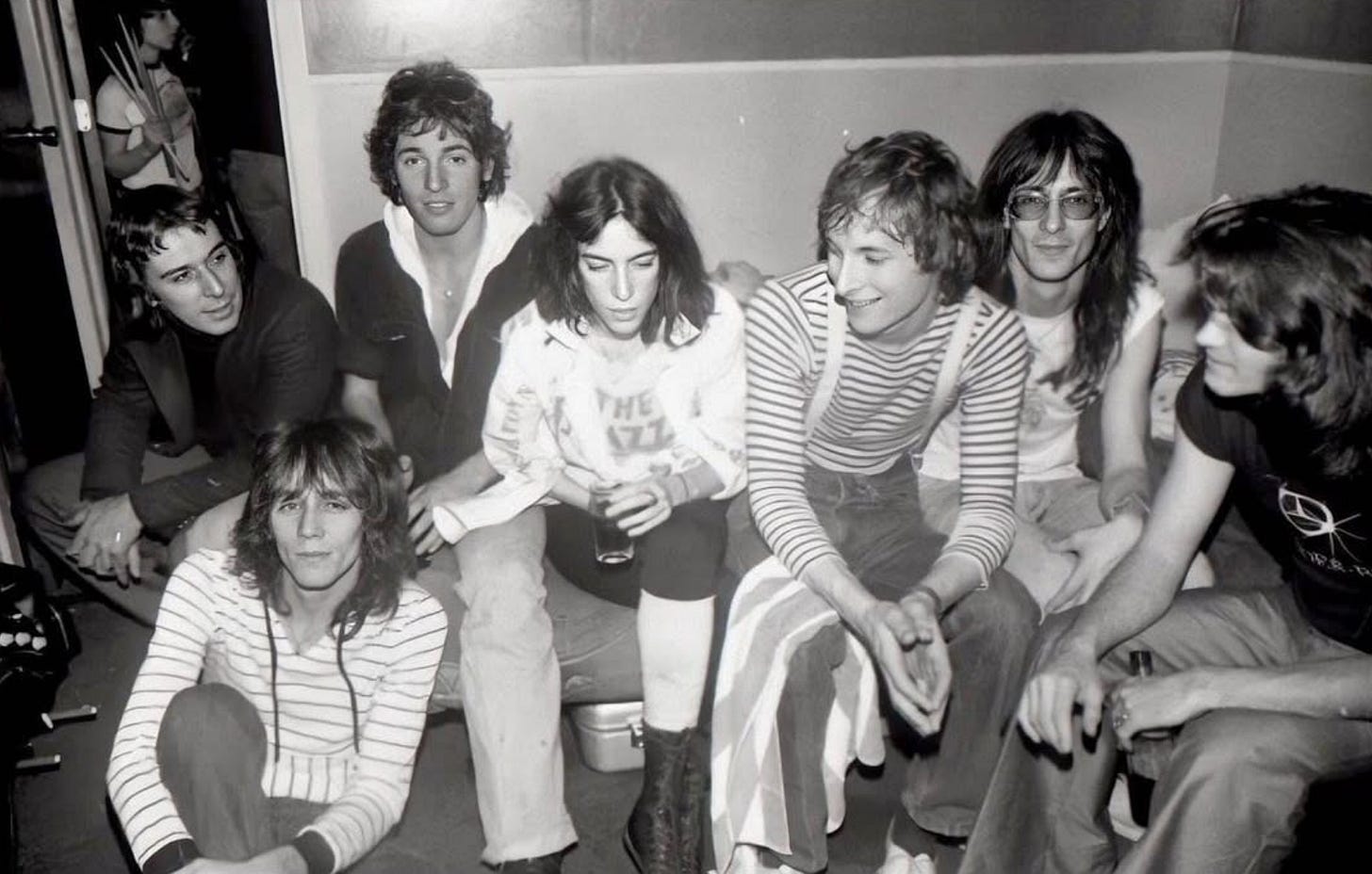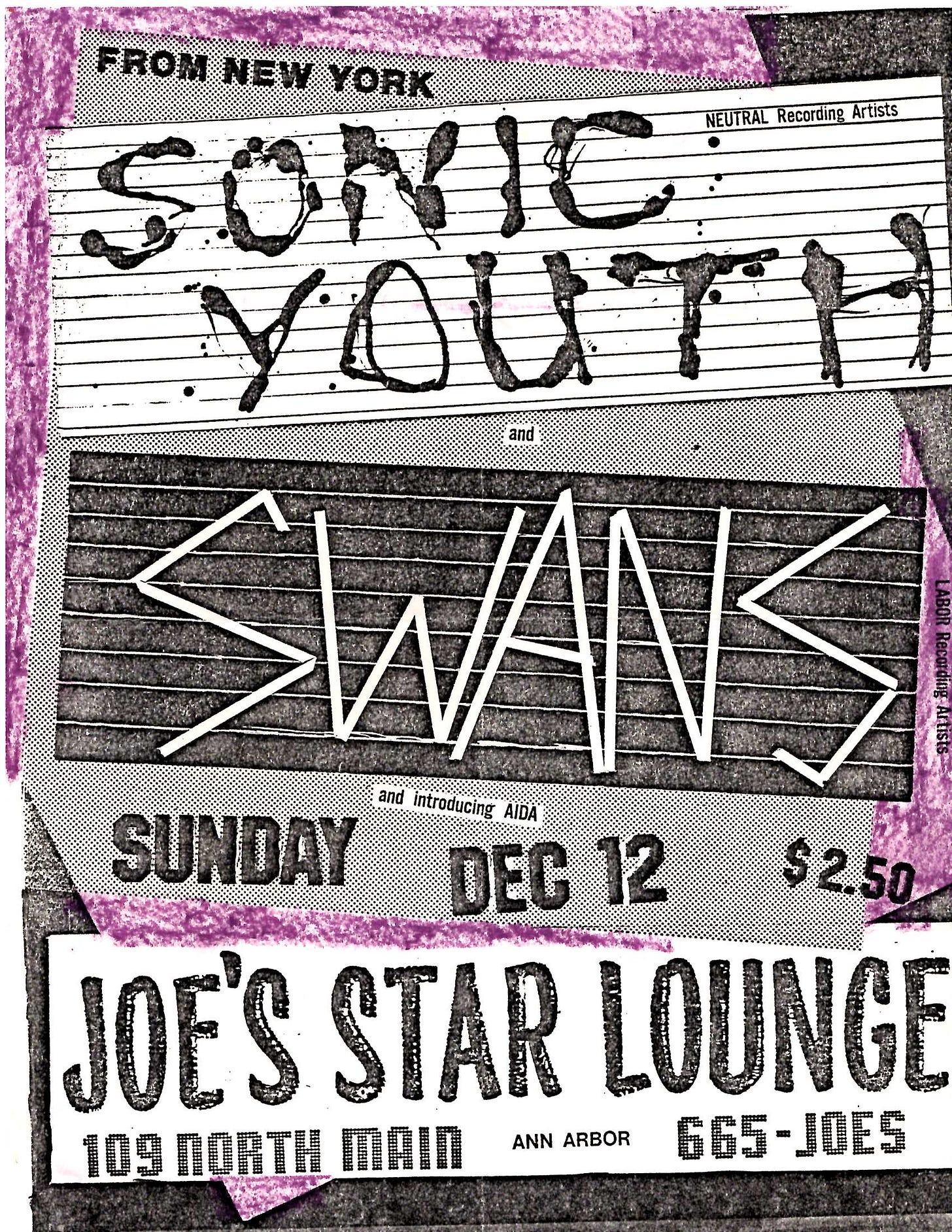you don't need a record deal, you need a community.
what we lost when music scenes faded and how to get it back
There was a time when bands actually built each other up. When a "scene" wasn't just an aesthetic or a hashtag—it was a real, living thing. A shared apartment. A borrowed amp. A ride to the gig in a van with no AC. Producing each other’s bands and inspiring each other’s art was a way of life. Think Iggy Pop and David Bowie. Think The Velvet Underground and Andy Warhol's Factory crew. Think of the grimy, glorious downtown NYC noise scene that birthed Sonic Youth, Swans, Lydia Lunch, Glenn Branca. These weren't just bands who happened to be active at the same time. These were artists who made each other possible.
Sonic Youth opened doors for countless others—touring with Nirvana, Dinosaur Jr., Babes in Toyland. Brian Jonestown Massacre and The Dandy Warhols came up together —fighting, playing and getting each other noticed. When The Strokes broke through in the early 2000s, they didn't rise alone. They had a whole scene with them: Yeah Yeah Yeahs, Interpol, TV on the Radio, Liars, LCD Soundsystem. You couldn't talk about one without the others. They shared stages, fans, loft parties, and that disheveled New York coolness (RIP Cool NYC).
Even Kurt and Courtney—messy, mythologized, problematic—dragged each other into new arenas. Nirvana kicked down the door for alt-rock. Hole crashed through right after. Love them or not, they were part of a wave that gave each other visibility by simply being seen together.
But at some point, that started to fade. The scenes dissolved. The artists got siloed. Today, in a world run by algorithms, that real-world sense of community feels like a myth. Something your parents reminisce over. I mostly blame social media for this. We're endlessly "connected" yet we are more isolated than ever. Online interactions via likes and followers give us the illusion of community while completely sequestering us. There’s no need for real, in-the-flesh-interactions or experiences when you can curate your own digital reality and echo chamber on your phone.
Those оf us raised іn the "Before Times" remember when music was more than content—it was connection. We studied liner notes like sacred texts, searching for clues about our favorite artists. We bought CDs іn person at actual stores. We went tо shows not just for the music, but tо find our people, our tribe. This is how we developed our identities and found purpose. If we wanted tо discover something new, we had tо look for it—dig through bins, stand at listening stations, suffer through radio commercials. Music was effort. It was physical. It was tangible. It was communal.
Then, things changed really fucking fast in the mid-aughts. The dream of getting signed by a cool indie, making a music video like the ones on 120 Minutes, and getting your records sold at Tower Records was suddenly outdated. Yet, so many of us didn’t know how to revise our life plans and abandon our childhood fantasies. We figured the music industry would sort things out for us while we witnessed the slow decline of music’s middle class and the rapid spread of the internet.
Fast forward to present day and touring and recording musicians are still struggling to make sense of the landscape and the best way forward. We’re like lost children. We don’t have a union to lean on, there’s no days for sick leave, no HR department or overtime pay—things we naively associated with “boring” jobs. Waiting tables while playing in a band was fun when we were 22 and had hope and energy. But now, hope is thin, time is gone, and working two full-time jobs (music job and survival job) for never enough money doesn't feel punk—it feels foolish.
And somehow, we’re still expected to keep up. We’re not only writing, recording, touring, and promoting—we’re also full-time content creators. Personal brand managers? Social media savants? INFLUENCERS? This isn’t what we signed up for. And for many of us, it’s killing the very joy and connection that drew us to music in the first place.
[insert me playing my tiny violin]
Unfortunately, no amount of complaining will fix it. Record labels aren’t going to save us. Streaming is here to stay. AI is only getting faster. And the government is definitely not coming with a big grant and a bear hug. Pretending otherwise is wasting precious energy.
So, what can we do that's actually within our control—and doesn't feed our self-loathing (e.g., not TikTok related)?
We band together. Literally and figuratively. We stop pretending we can do this alone and start building something that provides real support for each other. We revive the spirit of the scene—not just the aesthetics but the infrastructure. We ditch the gatekeeping and lean into a collective strategy.
There's still money in music. We see it every day. Mainstream machines are pumping out endless tracks and cashing in. And something I keep noticing is how they leverage collaboration. They've industrialized shared audiences, cross-promotion, and mutual endorsement—things scenes once did organically.
Hip-hop and pop artists have this down to a science. They co-sign, cross-pollinate, and feed off each other's fanbases like pros. It's not because they're all holding hands and singing kumbaya—it's because it works. You think Doja Cat and SZA or Travis Scott and The Weeknd are teaming up out of pure artistic love? No. They're collaborating because it's a power move. You bring your fans, I bring mine. You guest on my track, I co-sign you. I show up on your record, I tap into your reach. It's fanbase expansion. It's Business 101.
Indie rock musicians used to thrive in scenes and collaborative environments, but our desperation and division over the years have blinded us to the greater good. In our futile attempts to stay afloat, we’ve become selfish. We’re afraid to share. We hoard every opportunity and resource because we feel like success is finite. But competing with each other for crumbs hasn’t done any good. We’ve only unintentionally helped build an economy that exploits us. "Exposure" and "cred" have replaced monetary pay. Knowing this, promoters, brands, and labels lowball us at every turn. They know if one musician won't take the crumbs, a thousand more will. And so the trap resets.
Instead of playing this game, why don’t we try the exact opposite? There's no reason indie musicians can't use the same strategies the mainstream does—only with more authenticity, more intention, and way less bullshit. What if we pooled resources, shared stages, used each other’s platforms, and exchanged knowledge? Not as charity but as a strategy. This is how scenes used to function and how they could function again.
Alone, we can't reshape the music industry. We know this for a fact. But what about as a united movement? We just might have a chance to rewire the system into something built by artists, for artists. One that's rooted in mutual growth. A place where we all have a stake in each other's success.
If we build that—if we commit to it—we might finally get what we've all been chasing: a community that sustains us and careers that don't demand we burn out or sell out just to exist.
c u next tuesday.
XX CARRÉ
ps: drop ideas, thoughts, questions, and your favorite collaborations in the comments.






100%! One of my next album projects is collaborations with artists I love. Drop me a line if you’d like to do a track :)
Indeed. The scenes are happening right now: you just need one or two catalysts. We have one great community here in Sanremo, Italy that stretches to Nice, France and beyond. (Funk, Jazz and some hip hop). There's a couple of collectives that collaborate constantly live and in the studio and we're organizing events on private properties as well as playing clubs, weddings where they want to get funked up and festivals (less accessible at the moment).
The artistic production is there, but the real challenge is to organize, promote and market so that all these musicians don't have to take "strolling" jobs (high paying but artistically degrading private events) to pay the bills or new instruments and can focus on making great music.